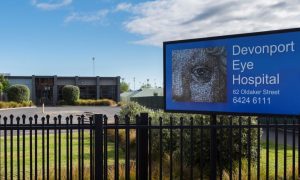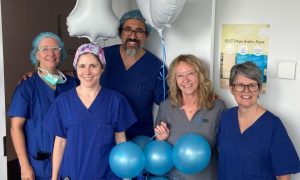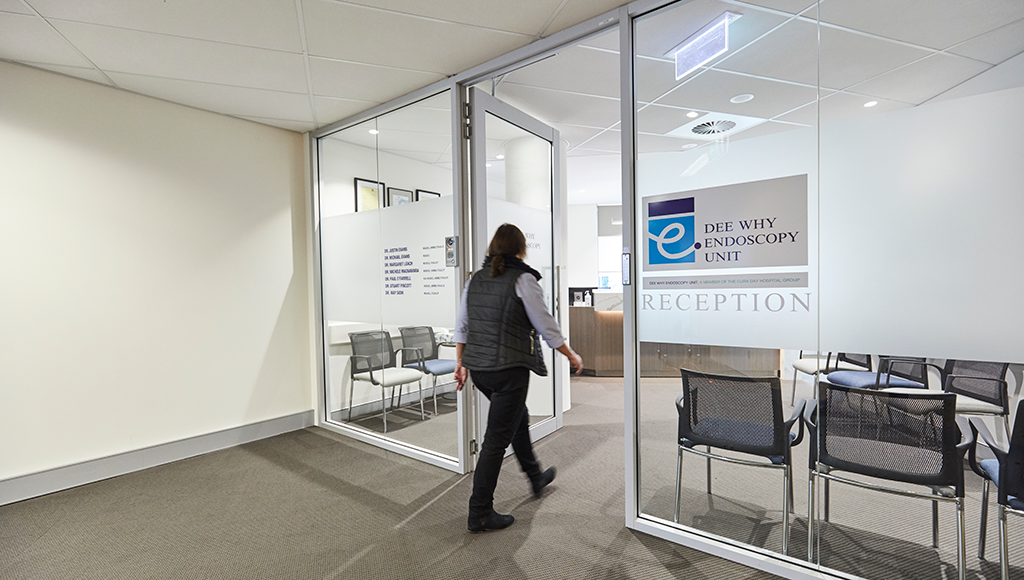Cura Group navigation
Hospital information
General information
Patient information
Welcome to Dee Why Endoscopy Unit
This patient information is designed to answer any questions you may have about your procedure or the hospital during your stay. Please feel free to discuss any queries or special needs with our staff and let us know if there is anything else we can do to make your stay with us more comfortable.
- Completed hospital paperwork is required to be emailed to [email protected]
- Parking instructions can be found at the bottom of this page under ”Patient Documents”
- Healthlink ID: deeyendo
Please use the expand and collapse feature below to find out more about your procedure
Open access suitability
Direct Access or Open Access Colonoscopy is most suitable for patients with a definite indication for colonoscopy, such as:
- A positive result from a Faecal Occult Blood test or the National Bowel Screening program
- Significant and unexplained rectal bleeding
- A persisting change in bowel function
- A family history of colorectal cancer consistent with the National Health and Medical Research Centre guidelines for bowel cancer screening
For patients with a history of adenomatous polyps or colorectal cancer, regular surveillance colonoscopy would also be recommended through the Open Access Program. Patients with non-specific abdominal pain, IBS type symptoms or chronic bowel problems like constipation may also benefit from a consultation as colonoscopy is not always indicated.
Open access exclusions
Not all patients are suitable for open access. For patients with significant comorbidities or elderly patients with multiple comorbidities, a consultation with a specialist prior to colonoscopy may be considered.
Your surgeon’s rooms will provide you with written information about the procedure and preparation required for the procedure you are about to undergo. It is important that you complete and return the Pre-Admission and Consent Forms given to you by your Surgeon to the hospital. If you have not received any forms yet, please phone the hospital before your admission date. Alternatively, you have the option to complete your admission form online. Please click the “Online admissions” button below to access our secure online admissions portal.
Be sure to confirm your level of cover with your health insurance fund and ensure that your contributions are up to date.
A member of our staff will contact you at least one working day prior to your procedure, to confirm hospital admission time, fasting time and any other preparations necessary for your surgery. Please use this opportunity to discuss any questions or concerns which you may have.
Important: You will also need to arrange for a carer to accompany you by private transport from the hospital and to supervise you for 24 hours after your operation.
In order to avoid delays, please allow sufficient travel time. When you arrive for your appointment please present yourself to our friendly reception staff who will confirm your details and ensure all appropriate paperwork is completed before you meet with the nurses. The pre-operative nurses will then assist you in preparing for your procedure.
How to prepare on the day of your surgery:
- Shower before arriving at the Hospital
- Wear loose, comfortable clothes (preferably front opening)
- No jewellery or valuables except for wedding bands
- No nail polish, make up or face cream
- No perfume or aftershave
- Do not smoke on the day of your surgery
What to bring on the day of your surgery:
- Medicare Card
- Health Fund Card
- Pension card / Veterans Affairs card
- Payment for your surgery or health fund excess
- A list of current medications
- Referral letter from your Surgeon
- Reading glasses and glasses case for safekeeping, if appropriate
- If you wear hearing aids or dentures, please bring the appropriate case for their safekeeping.
Virtually all surgical procedures require some form of anaesthesia however we understand that this can be an anxious time. We would like to reassure that you are in good hands. Anaesthetists in Australia are specialists in administering anaesthesia, as well as pain control, resuscitation and managing medical emergencies.
Your Anaesthetist will see you before the procedure, allowing you the opportunity to discuss any concerns. It is important that you disclose everything that you think is relevant, and also to follow the fasting instructions. Your Anaesthetist will monitor you during and after surgery to ensure a smooth and trouble-free recovery.
The use of new surgical techniques combined with modern anaesthesia results in more rapid recovery – making day surgery preferable to overnight hospitalisation. Anaesthesia can be administered in several ways.
Types of Anaesthesia:
Widely used techniques include the following:
Local/Regional: An injection around or behind the surgical site is administered prior to surgery to cause numbness to a large part of the body. It will not leave a scar as a very fine needle is used; however, the puncture site may have some bruising, redness or swelling, which usually heals in a few days.
Benefits of Local Anaesthesia
- Avoids the risks of a general anaesthetic
- Nausea and vomiting after surgery are uncommon
- More rapid recovery
- Generally, postoperative pain or discomfort is minimal
- Eating and drinking can be resumed soon after surgery.
IV Sedation: Local anaesthetic may be combined with IV sedation. IV sedation is anti-anxiety drugs which are administered intravenously in order to make the patient feel relaxed and comfortable during the surgery.
General Anaesthesia: With general anaesthesia you are put into a state of pain free unconsciousness for the duration of the operation. This is achieved by injecting drugs and inhalation of gases. A breathing tube will be put into your windpipe.
Topical Anaesthesia: Drops, sprays, ointments or gel are administered to numb the surface of the surgical site before and during the operation.
What are the risks of the anaesthetic?
Modern anaesthesia is generally very safe. Every anaesthetic has a risk of side effects and/or complications. The risk to you will depend on the length and complexity of your surgery and on personal factors such as pre-existing medical conditions, and whether you smoke or are overweight.
Common side effects and complications of anaesthesia may include:
- Nausea or vomiting
- Headache
- Pain and/or bruising at injection sites
- Sore or dry throat and lips
- Blurred/ double vision and dizziness
- Problems in passing urine
- Preparing for your anaesthetic
It is very important not to eat, drink, or chew gum before your surgery. You will be told when to have your last meal and drink. If you eat or drink after that time, your operation maybe delayed or cancelled.
You are at less risk of problems from anaesthetic if you do the following:
- Increase your fitness
- Give up smoking
- Carefully follow the fasting instructions given to you
- Inform your anaesthetist if you are taking any blood thinning medication
- Inform the anaesthetist if you are using recreational drugs as these may interfere with the anaesthetic
After the procedure:
- You will be assisted into recovery where a nurse will monitor your progress
- Once you are fully recovered you will be offered light refreshments and beverages
- When you are ready to be discharged home from surgery, our nursing staff will contact your carer and provide directions to the discharge lounge
- Both you and your carer will be provided with written and verbal details regarding post-operative care, emergency contact information, and details of any post-operative appointments that you may have.
- You will then be handed over to your carer who will stay with you for the remainder of the day, and overnight.
- You may receive a courtesy post-operative phone call from our nursing staff in the days following your procedure
Things for you to avoid after anaesthesia:
- Do not drive or operate machinery
- Do not have a heavy meal or drink alcohol
- Do not conduct business or sign legal documents
- You need a responsible adult to accompany you home and stay with you for 24 hours
- Do not drive or travel alone. No matter how you feel, an escort is essential for your safety
Please note that if you do not have a carer your surgery will be cancelled and re-scheduled to a date when a carer is available to stay with you for 24 hours.
If you have any questions or concerns following the procedure, please contact our friendly staff
It is important to note that your fee for surgery with us cannot be claimed through Medicare.
Patients who are not covered by private health insurance or WorkCover are required to settle their account on the day of their procedure.
If you have agreed with your Health Fund to pay an excess or a co-payment, you will be asked to make this payment on the day of your admission. Please contact your Health Insurance provider prior to the procedure to check the coverage provided by your particular Health Fund.
You are only required to pay for the cost of the hospital facility fee on the day of your surgery. You may pay by cash, bank cheque, credit card or EFTPOS. If paying by EFTPOS please check prior to day of admission if you have a daily withdrawal limit as it may not be enough to cover full payment.
You will also receive separate accounts from
- Your Surgeon
- Your Anaesthetist
- Pathology (if applicable)
Your Gastroenterologist’s rooms will provide you with written information about the procedure and preparation required for the procedure you are about to undergo. You will also complete your patient forms and be advised of your fasting and admission time at the Surgeon’s rooms.
Be sure to confirm your level of cover with your health insurance fund and ensure that your contributions are up to date.
How to prepare on the day of your procedure:
- Shower before arriving at the Hospital
- Wear loose, comfortable clothes
- No jewellery or valuables except for wedding bands
- No perfume or aftershave
- Do not smoke on the day of your surgery
What to bring on the day of your procedure:
- Medicare Card
- Health Fund Card
- Pension card / Veterans Affairs card
- Payment for your procedure or health fund excess
- A list of current medications
- Referral letter from your doctor
- Reading glasses and glasses case for safekeeping, if appropriate
- If you wear hearing aids or dentures, please bring the appropriate case for their safekeeping.
Virtually all surgical procedures require some form of anaesthesia however we understand that this can be an anxious time. We would like to reassure that you are in good hands. Anaesthetists and Sedationists in Australia are specialists in administering anaesthesia, as well as pain control, resuscitation and managing medical emergencies.
Your Anaesthetist or Sedationist will see you before the procedure, allowing you the opportunity to discuss any concerns. It is important that you disclose everything that you think is relevant, and also to follow the fasting instructions. Your Anaesthetist will monitor you during and after your procedure to ensure a smooth and trouble-free recovery.
The use of new surgical techniques combined with modern anaesthesia results in more rapid recovery – making day surgery preferable to overnight hospitalisation.
Anaesthesia used at ACT Endoscopy:
IV Sedation: Local anaesthetic may be combined with IV sedation. IV sedation is anti-anxiety drugs which are administered intravenously in order to make the patient feel relaxed and comfortable during the procedure. You are asleep during your procedure and you will still be breathing on your own. You will have an oxygen mask on your face providing you with oxygen as you sleep.
What are the risks of the anaesthetic?
Modern anaesthesia is generally very safe. Every anaesthetic has a risk of side effects and/or complications. The risk to you will depend on the length and complexity of your procedure and on personal factors such as pre-existing medical conditions, and whether you drink, smoke or are overweight.
Common side effects and complications of anaesthesia may include:
- Nausea or vomiting
- Headache
- Pain and/or bruising at injection sites
- Sore or dry throat and lips
- Blurred/ double vision and dizziness
- Problems in passing urine
Preparing for your anaesthetic:
It is very important not to eat, drink, or chew gum before your procedure. You will be told when to have your last meal and drink. If you eat or drink after that time, your procedure maybe delayed or cancelled.
You are at less risk of problems from anaesthetic if you do the following:
- Increase your fitness
- Give up smoking
- Carefully follow the fasting instructions given to you
- Inform your anaesthetist if you are taking any blood thinning medication
- Inform the anaesthetist if you are using recreational drugs as these may interfere with the anaesthetic
It is important to note that your fee for your procedure with us cannot be claimed through Medicare.
Patients who are not covered by private health insurance or WorkCover are required to settle their account on the day of their procedure.
If you have agreed with your Health Fund to pay an excess or a co-payment, you will be asked to make this payment on the day of your admission. Please contact your Health Insurance provider prior to the procedure to check the coverage provided by your particular Health Fund.
You are only required to pay for the cost of the hospital facility fee on the day of your surgery. You may pay by cash, bank cheque, credit card or EFTPOS. If paying by EFTPOS please check prior to day of admission if you have a daily withdrawal limit as it may not be enough to cover full payment.
You will also receive separate accounts from
- Your Surgeon
- Your Anaesthetist
- Pathology (if applicable)
- Online admissions




